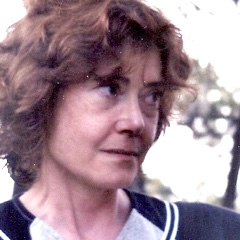Diann Blakely, 1957-2014
Poet Diann Blakely has died after a long illness
“I should note that I don’t consider myself a literary critic,” Diann Blakely once wrote in an essay for Chapter 16 about Eleanor Ross Taylor. “Rather, I am a passionate, studious, unfashionably earnest reader and an advocate for the books—especially books of poetry—I care deeply about.” Blakely wrote a lot of words during her years as a poet and a reviewer of poetry, but these could serve almost as a mission statement for her entire life, which ended on August 5 following a long struggle with a hereditary lung disease known informally as Alpha 1.
 A graduate of both the University of the South in Sewanee and Vanderbilt University in Nashville, Blakely was the author of three poetry collections: Hurricane Walk; Farewell, My Lovelies; and Cities of Flesh and the Dead. At the time of her death last week at age fifty-seven, Blakely was working to complete two more collections: Rain In Our Door: Duets with Robert Johnson and Lost Addresses: New and Selected Poems.
A graduate of both the University of the South in Sewanee and Vanderbilt University in Nashville, Blakely was the author of three poetry collections: Hurricane Walk; Farewell, My Lovelies; and Cities of Flesh and the Dead. At the time of her death last week at age fifty-seven, Blakely was working to complete two more collections: Rain In Our Door: Duets with Robert Johnson and Lost Addresses: New and Selected Poems.
Born in 1957 in Anniston, Alabama, Blakely grew up in Birmingham, where her life of relative privilege in the suburb of Mountain Brook kept her largely insulated from the city’s infamous unrest during the civil-rights era. This gulf between her own experience and that of the African-American housekeepers whom she loved and who largely raised her became an obsessive subject for Blakely, who spent much of the last twenty years of her life working on a series of “duets with Robert Johnson,” her protracted attempt to reconcile the life she lived but did not wholly understand with the issues of gender, race, and class that exploded during the years of her childhood. In “Birmingham, 1962,” she wrote:
Scarcely affluent, we always had maids.
One worked a few months then left for Detroit,
the next for a husband’s home town; some took
their children and returned to elderly mothers
who still lived beneath rural tin roofs,
having found cities and their men “no good.”
I was a good girl, they all told me so
when I’d stand by their ironing boards, dipping
my fingers in a bowl of water to sprinkleon my father’s shirts, my mother’s lace-wristed
blouses, the pale dresses I wore to church.
The TV murmured with husky-voiced women
in negligees; I was admonished to listen
to what preachers told me, to remember
that Jesus was watching always. I watched
black hands guiding roasts out of ovens,
turning pieces of chicken in skillets
of sizzling oil, noticed the rough pinkof blisters and scars. These hands dressed me
each morning; I imagined they loved me.
In an analysis that accompanied the publication of “Dead Shrimp Blues,” one of the Robert Johnson duets, Lisa Russ Spaar writes in The Chronicle of Higher Education of Blakely’s “spiritual ventriloquisim,” noting that she was “less concerned with offering confusion-ending answers to the issues of gender, race, and region raised in her duets than she is with allowing the various, often contradictory cries of mothers, fathers, sons, daughters—across time, race, art form, and culture—to erupt through her own. The result in Blakely’s poly-vocal ‘Dead Shrimp Blues’ is a refusal to allow any human voice to be shut down or posted out.”
Blakely’s extra-literary work, like her poems, was actually about far more than simply refusing to allow any human voice to be boxed out. Poet Kate Daniels remembers Blakely’s gift for connection: “I came to admire her poetry, her brilliant mind for literary criticism, and the many quirky sweetnesses that characterized her distinctive way of being in the world,” Daniels wrote in an email, recalling “with particular fondness an all-women dinner party at her house, served on her grandmother’s silver, where the conversation across the candlelight was challenging, intense, and stunningly smart.” In later years, illness and its necessary isolation forced online Blakely’s efforts to build a literary community. A Facebook forum she founded, Notes on the State of [Southern] Poetry, began as Blakely’s continued attempt to link poets, to help those engaged in what can be an isolating art to find a sympathetic ear and a cheering voice. In her description of the group’s mission, she wrote, “We seek to explore the cultural multiplicity of places traditionally associated with the American South and the various forms of art created therein; but we wish always to stress national and global connections. All are welcome to join. No exclusivity permitted.”
As Blakely wrote in her essay about Eleanor Ross Taylor, “All poets wish to leave behind first-caliber work that, however absurdly overlooked and under-known in her life, will last.” Diann Blakely chafed at the long illness which kept her so confined and her energy so limited, but even in her struggles and her suffering, she must have known that her best poems, though fewer than she hoped there would be, will surely last.
[To read poet Mark Jarman’s remembrance of Diann Blakely for Chapter 16, click here. To visit Blakely’s website, click here. To read a career-spanning selection of Blakely’s poems, click here. To read Blakely’s obituary in The Tennessean, click here.]
For more updates on Tennessee authors, please visit Chapter 16’s News & Notes page, here.
